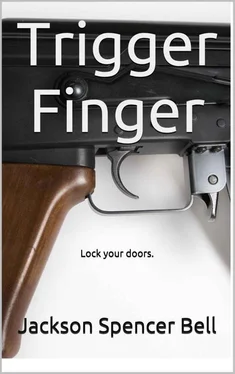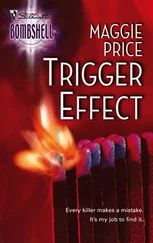“Oh, you’re done?”
“Yeah,” I said, reaching for my magazine again and rolling it into its familiar tube shape. “It’s been nice knowing you, but we’re done here. I’m going back to work.”
I rose, but his voice reached out and cracked like a whip.
“Sit down.”
I stopped. Not so much out of any fear of him, but because he’d never spoken to me with such a firm tone before.
He shook his head, covered his face. Breathed so loudly that it qualified as a groan. Then he stood up. I started to rise, too, but he held a hand up.
“You stay right there,” he commanded. “Right there. I don’t want you leaving that couch.”
“Uh… okay.”
He walked briskly over to his desk and picked up the phone. He pushed a single button, waited. Then he said, “It’s Wheeler. This isn’t working.”
“What’s not working?” I asked. “Who’s Wheeler?”
He ignored me. He turned to one side—not away, not to where he couldn’t see me, just to one side to make it clear he didn’t want to hear what I had to say right now—and continued talking into the office phone. “I tried your way, now we’re using mine. We’re out of time here. I can’t wait any longer.”
Pause.
“It’s less than twenty-four hours away. Seriously, we reconvene in the morning.”
Pause. Then:
“Yes. Absolutely. Okay. If it doesn’t go well, I’ll call for you.”
He hung up the phone and walked, slower now, back over to his easy chair. True to his orders, I remained on the couch.
“What was that?”
“Okay,” he said. “We’re going to try a different tack.”
I felt like I’d just stepped into the Twilight Zone. “Uh… okay.”
“Tell me something; what do you think happened just now?”
“You talked to somebody on the phone.”
“No. With your house. The guy trying to choke you, Allie’s keys. The rifle disappearing from your hands, what do you think all that was?”
I swallowed. Ki breath.
“I’m suffering from a particularly serious case of post-traumatic stress disorder,” I replied. The words came out slippery, diarrhea from my mouth. “My anxieties have grown so strong that I’ve blurred the line between reality and fear. I’m having a nervous breakdown. I’m mentally ill. I need medication. I can’t tell reality from bullshit. I should probably be committed right now. I’ll sign myself in wherever you want, you just let me know…”
He reached into his briefcase. At that moment, stark fear stabbed into me with the speed and violence of a killer’s blade.
His hand came out. In it rested a fresh, unmolested copy of Southern Rifleman. My issue.
“I ordered this some time ago,” he said. “Had it sent to my house. And when I got it, I flipped to the back and discovered a significant difference between what you recited to me at our first meeting and what is written in this issue. Would you like for me to read the Hero of the Month article to you?”
My eyes narrowed. My heartbeat quickened again. Ragged now, so many times had it started and stopped in the past few minutes alone.
He flipped to the back. He began to read.
“Kevin Braxton,” he read, “an active-duty member of the United States Marine Corps and a veteran of the Iraq war, successfully defended his Woodbridge, Virginia home on the night of February 1, 2010 after Leon Pinnix and Trayshaun Ramseur gained entry through an unlocked window in the basement. And this man’s name is Braxton, by the way. Not Swanson.”
He looked up.
“Says here that Sergeant Braxton had a Smith & Wesson Model 629 revolver with a 6-inch barrel,” he said. “They never made it out of his basement. He got them on the stairs.”
My hands began shaking. My stomach twitched once, twice, in a very credible threat to evict everything I’d eaten that day. I looked out the window and noticed that the character of the light had changed. Late afternoon now, very late. Not too far from a point where you’d have to start calling it night.
“That’s fucked up,” I said in a voice that shook in time with my hands. “That’s one hell of an error on the printing line, I’ll tell you that. I bet some heads rolled for that one.”
“Sergeant Braxton had a wife and a daughter about Abby’s age. So all that matches. But there’s no mention of Burlington, North Carolina or a lawyer named Kevin Swanson anywhere on this page. Anywhere in this magazine, in fact. And oh, guess what kind of rifle that is on the cover?”
I didn’t answer.
“It’s an AK-47,” he said.
I didn’t respond to that, either. I didn’t respond because I couldn’t breathe.
He laid the magazine down on his shitty coffee table. He appeared to be thinking, but then I got the idea that he just didn’t want to look at me for a while. He closed his eyes and took a ki breath of his own—apparently, I didn’t hold the patent on that technique. Then he continued.
“If you want to read anything about you,” he said, “you have to get your hands on a back issue of the Burlington Times-News from February 4, 2010.”
“No,” I whispered.
He reached into his briefcase again and pulled out a folded-up newspaper. “Do you want me to read this to you?”
I closed my eyes and willed myself to slide. When I opened them again, I hadn’t gone anywhere.
“I’ll summarize it for you,” he said in a softer tone. “What it says is, on the night of February 1, 2010, a single intruder broke into the home of attorney Kevin Swanson off Highway 62 in southern Alamance County. It’s kind of a dry account, as newspapers often are. Gives the bare minimum facts. A lot of quotes from community members. The February 4 issue is the first story. There were other stories in newspapers across the country, but this was the first one. Because it happened here. In Burlington.”
“I don’t know what you’re talking about,” I tried to say. But the words hung up in my throat.
Bobby? I cried out.
No answer.
“I can give you a lot of detail,” he said. “I’m privy to a lot of the facts here, most of which aren’t properly reflected in the newspapers’ accounts. Kevin Swanson didn’t have an AK-47—he actually didn’t have anything, because he never felt like he needed to keep firearms in his home. The question had just never come up for him. So when he was downstairs in his basement, watching the end of the Carolina-Virginia Tech game with his wife and thirteen-year-old daughter, he didn’t have a gun safe to go digging around in when he heard a strange noise upstairs.”
“What’s going on here? What are you doing?”
“Kevin Swanson is six feet tall,” he continued, “and well within his physical prime. He had taken several years of martial arts training in his youth and felt generally confident and secure. Had he actually owned a firearm, it probably wouldn’t have helped him that night, because the deciding factor there was his mindset. Kevin thought something had fallen in the kitchen. He wasn’t thinking there was a burglar. He thought, something fell, I’m going to go see what it is. Even if he’d owned a whole slew of semiautomatic weapons, he wouldn’t have taken one with him into the kitchen because he wasn’t thinking that way.”
I began to rock back and forth on the couch. I lifted the front legs with every backward roll. I shook my head—but he kept talking.
“Kevin Swanson believed in a civilized world,” he said. “He lived a good life, a happy life. He got up every morning, he went to work, he supported his family. He lived right. And he had every reason to believe that if he continued to live right, if he continued to do the right thing every day, life would continue for him the way it always had.”
Читать дальше












